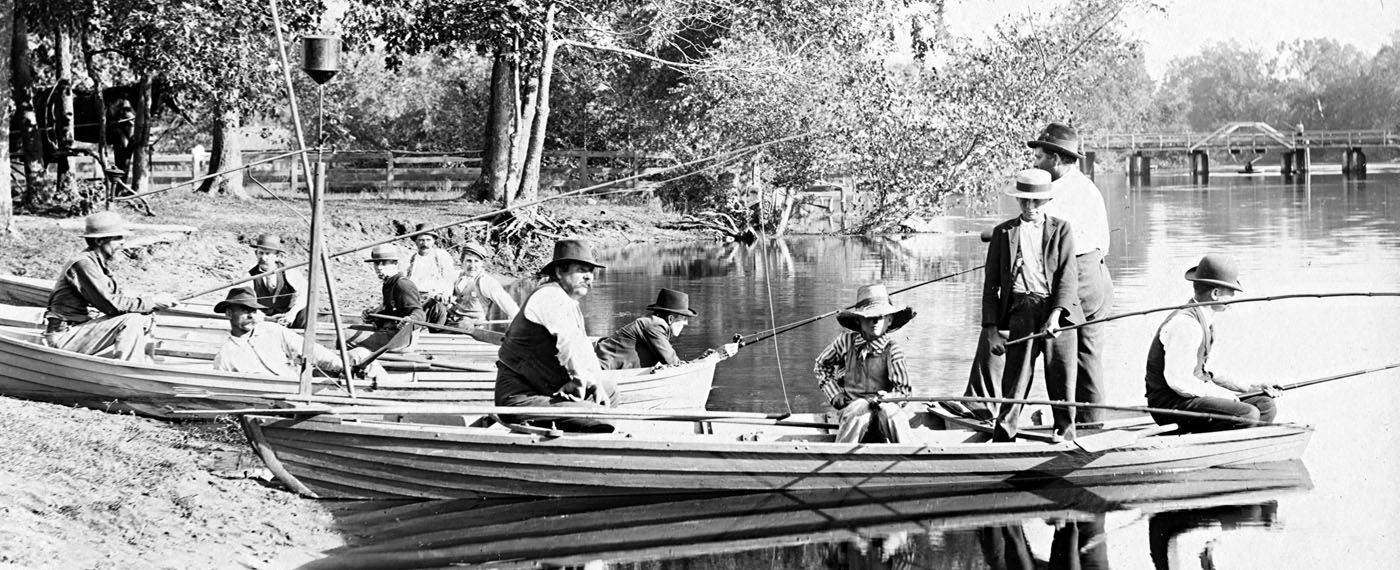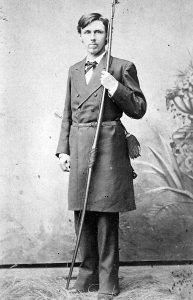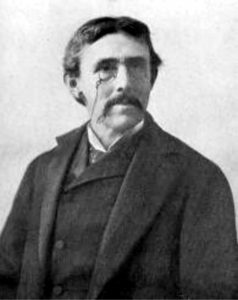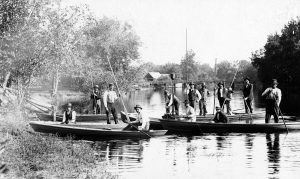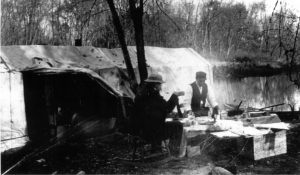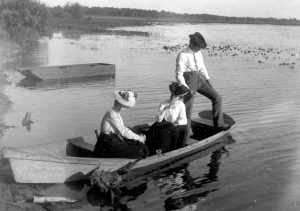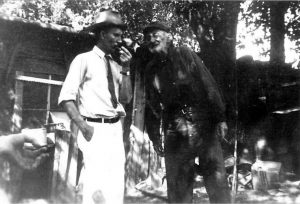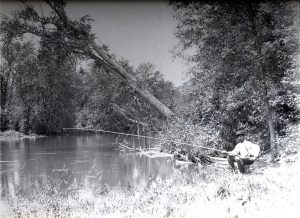On the Kankakee
The Famous Haunts of Game and Sportsmen Imperiled by a Proposition to Drain the River Marshes.
By James Maurice Thompson-An Early Kankakee Marsh Preservationist
Crawfordsville, Ind., May 8. — Since the formation of a fish commission in Indiana, and the passing of stringent game law by the Indiana legislature, certain parties who have made vast airy schemes of public improvements subject of unreasoning but quite imaginative study, have suddenly discovered that the marshes of the Kankakee must be drained. Gov. Albert G. Porter has appointed Prof. John L. Campbell of centennial fame, to examine the scheme and report upon its feasibility. In order that Prof. Campbell might accept the commission, Gov. Porter procured from the United States government a suspension, for this summer, of the geodetic survey of the state, which has been in the professor’s charge. I speak of this in connection with the fish and game protection laws, for the reason that the marshes of the Kankakee, and the Kankakee itself afford the finest fishing and hunting in the state, and because any successful draining operation of the sort contemplated will not only eliminate the marshes but also practically dry up the river, in so far as its usefulness as fish stream is concerned.
The ponds and lagoons of the Kankakee are the stopping places for wild fowls of all sorts on their way between the south and north in their spring and fall flights, and the river itself is as famous for mallards and teal. its wood ducks and ruffle-heads, geese and brant. as it is for its pike, pickerel, bass and perch. Nowhere north of Florida is there a stream bordered by so vast an extent of genuine marsh such as affords for aquatic game birds and birds most interesting to the naturalist. Here come wood duck Carolina rail, snipe, plover, many species of heron, geese, duck, starlings, the grackle, the gallinule, and many other waders and swimmers, some of them to breed In the watery meadows and wild wastes of weed and aquatic plants. I have nowhere seen, not even in the Everglades of Florida, so many green herons as live in the dark lagoons in the neighborhood of English Lake, a which is simply a wide place of the river. They rest there by thousands, as also do the larger bitterns, called by the Kankakee folks “thunder-pumpers.” Singular enough is the fact that even in midsummer and autumn this swampy region of the Kankakee far from unhealthy. The water of the river is strongly impregnated with iron, and many persons have for and great relief from nervous debility by camping by the stream curing the last weeks of summer and the early weeks of autumn.
The late ex-Gov. Henry S. Lane used to spend many weeks each year on the Kankakee with a party of congenial friends, and his brilliant conversational powers were never more attractive than when by the camp-fire be related his many reminiscences of a varied and charming life. He was an expert angler and a great lover of nature, as a wise politician. His stopping place on the Kankakee was at the clubhouse of Crawfordsville sportsmen, a club of which Gen. Lew Wallace, our present minister to Turkey, is a member. I met Gen. Lew Wallace at his clubhouse while he was yet busily engaged in writing “Ben Hur,” and we sketched together in region. He is an artist of great power, sketching from nature with readiness and strength off at outline, especially the human figure, which have seldom seen surpassed. He is not so ready and entertaining story-teller as was Col. Lane, but he more of a scholar and poet, full of grand dreams and glittery flashes of original thought. Senator Ben. Harrison comes to the Kankakee too, to rest his big head and avoid interviews at critical junctures. The senator is a patient angler, giving immense thought to the method of hooking live bait. It will be remembered that he was in these northern marshes in pursuit of fin and feather when called to take Mr. Orth’s place at the head of the state ticket, the year when Blue Jeans Williams snowed him under. Gen. Harrison is intellectually a superior man, but more of a closet student than a popular leader.
Another distinguished visitor to the Kankakee is the Rev. Myron W. Reed, of Indianapolis, who a has, for some years. been rapidly coming to the front as a preacher of sermons with philosophy in them. He is now most favorably mentioned as a probable gubernatorial candidate. Dr. Reed tells a good story, handles the, oars, the gun and the fishing-rod with all the ease of a born sportsman, and little of the sanctimoniousness of the old-style preacher. He is one of the boys, in a good hearty sense. I mention these names to illustrate the importance the Kankakee and its marshes to men of genius and culture, as well as to the ordinary sportsman, to say nothing of the numerous professional market hunter who supply from this region the table of Chicago, Cincinnati and New York so many tidbits of fish and game, and themselves and families with a livelihood.
The scheme of draining these marshes has not yet taken any definite shape. No doubt if there is not a ring in connection with it there will be one before the matter is much developed. Viewed superficially, it would seem that much land might be drained in certain places so as to partially or altogether reclaim it, but everyone knows at what cost such public schemes usually worked out, and with what unsatisfactory results save to a favored few under cover of comprehensive utilitarianism go attractive to the average American, the fat jobs of our legislature are perfected. No doubt some thousands of dollars of the of the people’s money will be spent in making foolish surveys and level of these barren Kankakee bogs, and the matter will sleep. But should a report favorable to ultimate reclamation he made, the scheme may blossom into a grand affair for lot of land speculators. It can never be anything better.
However, returning to the Kankakee as is, one can find no more charming stream in west for the purpose of boating and fishing, hunting and botanizing. English Lake gives room for fine sailing, as there are constant, breezes from the surrounding barrens and prairies. The canoeist can find ever-varying scenes as he threads the almost amber colored channels among the weed islands and vast stretches of lily-pads. In many places the stream is bordered by dense forests, in which considerable number of deer still roam and where some almost extinct tribes of birds are represented, notably the log cock or great American woodpecker. The trappers and market-hunters of the Kankakee are, suigeneris, characters worth knowing and studying. One of them who told me he was in employ of the Smithsonian institute, I found dwelling in a picturesque cabin in the midst of a wood. He was not an uneducated man, but he had quite a number of books on natural history, taxidermy and woodcraft, which from their well-thumbed condition, I judged he had studied a great deal. He a large collection of bird-nests, eggs, skins, pressed plants and flowers, all of which preparing to send to the institute. He was quite alone, miles from any human dwelling, very happy, it seemed, and industriously plying his chosen business. He could give the scientific names of all the birds and animals of the marshes and was keeping in a book very clear notes of all his observations and experiences. Most of these “swamp angles” as sportsmen dub then, are very ignorant, uncouth strange beings, scooting about from place to place in their rude skiffs, living a hard, exposed and toilsome life, speaking the dialect of old-time frontiersman, and in fact, bearing undoubted marks of having been left over from backwoods days. They all oppose, to the death, every scheme interfering with their marshy domain. Many of them own considerable tracts of the wildest stretches of the marsh, holding the chief value thereof to rest the amount of surface offered to jacksnipe, rail, woodcock, plover, duck and geese. They are generous to sportsmen, provided the ladder will not interfere with the traps, weirs, gill-nets and various other unlawful fixtures everywhere in the swamps and river. They honest in their own way, having little greed and only ask to be left alone as they are. Should the region be successfully drained they will disappear as suddenly and mysteriously as the herons and geese.
The Kankakee region is rich in flora. Its lilies are exceedingly fine. The odorous white lily, sometimes tenderly pink, attains here a size and perfection rarely equaled, and the nymphea tuberosa, with its faint fruity perfume flaunts its snowy flowers in many of deep pools. The smaller yellow lily, nuphur pumilum, is for and here; the larger variety, luten is rare. The arrow leaved spatterdock seems the only kind not noted, though it may be plentiful in some places.
The current of the river, though apparently sluggish, is quite strong in places, and affine trolling may be had with the pike and bass. In the stiller pools, near heaps of driftwood or overhanging roots of old trees the sun-perch and google-eyes sometimes offer excellent sport. But the September wood-duck shooting offers altogether the greater attraction to the gunning sportsman. The birds are then young, in flocks of from ten to twenty, in excellent condition and not wild. So many railroads cross the Kankakee that its choicest regions are easily accessible from almost any place in the west. Good camping-grounds are everywhere along its shore, where fuel and excellent water are plenty. The soil of the greater portion of the land proposed to be reclaimed is not that deep black alluvium so common to marshes, but is a sort of wet, barren prairie, which wherever it rises above the water line, is covered with scrub oaks. It cannot be said to promise any great returns in an agricultural way, no matter how successful the draining operations may prove. A large amount of fairly good pasture lands and some meadow tracts might be for and, but there would be little soil fit for corn, and none for wheat. The region was made for the sportsman, the naturalist, the brain-weary statesman, the waterfowl and the fishes, the lilies and cresses. It ought never to be drained. But is an excellent subject for a summer survey, and a fine mash in which to sink some thousands of the surplus funds.

